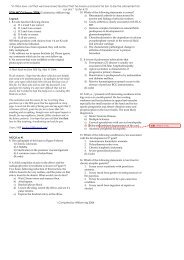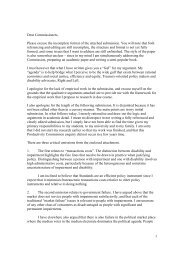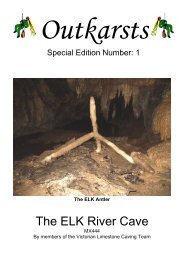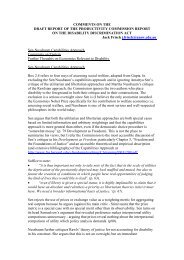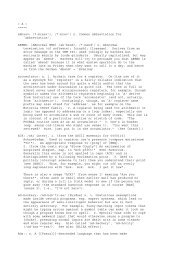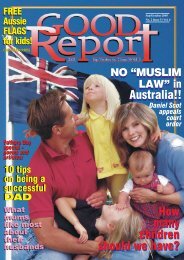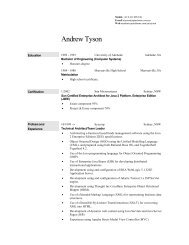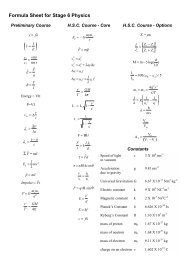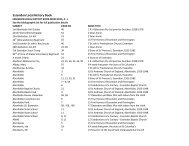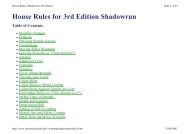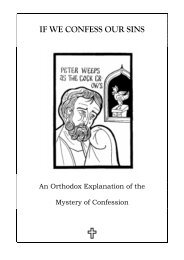E when followed by a doubled consonant or <strong>in</strong> an unstressed syllable, the sound is as <strong>in</strong>English "bet" e.g. "penn" (head), "tiek" (farmer). When followed by a s<strong>in</strong>gle consonantor stressed it has the same sound but lengthened as <strong>in</strong> French "tête", "frêne". This isNOT the same as the vowel sound <strong>in</strong> English "made" or the French "E acute".EU as <strong>in</strong> English "purr" or more accurately as <strong>in</strong> French "peur", e.g. "beudhi" (todrown).EW approximately as <strong>in</strong> English "cow" as said <strong>in</strong> some parts of Cornwall, or moreaccurately as Welsh "tew". Try to say the sound of E <strong>in</strong> "bet" followed immediately bythe vowel sound <strong>in</strong> "boot". <strong>Cornish</strong> people can usually make this sound more easily thanEnglish people.EY as <strong>in</strong> English "veil", e.g. "bleydh" (wolf).G as <strong>in</strong> English "get" (never as <strong>in</strong> "giant").GH sounds as CH <strong>in</strong> Scottish "loch" or German "achtung". The English speaker canachieve this sound by heavily breath<strong>in</strong>g an H sound, but unlike H <strong>in</strong> English, the<strong>Cornish</strong> GH comes <strong>in</strong> the middle or at the end of words and so can be slightly unnaturalfor the English speaker, e.g. "yeghes" (health).I as EE <strong>in</strong> English "beet", e.g. "gwir" (true).IW as English EW <strong>in</strong> "dew", e.g. "niwl" (mist).O normally as the vowel sound <strong>in</strong> English "bought", but as <strong>in</strong> "pot" when followed by adoubled consonant, e.g. "lost" (tail) as <strong>in</strong> "bought", "bronn" (hill) as <strong>in</strong> "pot".OE very approximately a cross between English "toe" and "saw". More accurately asfrench "eau", e.g. "boes" (food).OU as <strong>in</strong> English "boot", e.g. "gour" (husband).OW as <strong>in</strong> "grow" NOT as <strong>in</strong> "cow", e.g. "down" (deep).R should ALWAYS be sounded, i.e. rolled <strong>in</strong> words like "kar" (friend).U usually pronounced as <strong>in</strong> French "tu". It is a cross between English "ee" and "oo" andis notoriously difficult for English speakers. Sometimes used by Scottish speakers ofEnglish say<strong>in</strong>g "you", e.g. "tus" (men, people).Y when found at the end of a word or between consonants (i.e. not with another vowel)the sound is as I <strong>in</strong> "bit" e.g. "bys" (world). When followed by a vowel the sound is as<strong>in</strong> English, e.g. "redya" (to read).YW as English EW <strong>in</strong> "dew", but not as <strong>in</strong> English "you".
Lessons <strong>in</strong> Spoken <strong>Cornish</strong>Lesson 2 -- Greet<strong>in</strong>gs and PhrasesPyth yw dha hanow?What is your name?Peder ov, ha ty?I'm Peter, and you?Jori yw ow hanow vy.My name is George.Lowena dhis, Jori!Goodbye, George!(lit. "happ<strong>in</strong>ess to you")Dyw genes, Peder!Goodbye, Peter!(lit. "God with you")Dydh da!Hello!(lit. "good day")Fatla genes?How are you?(lit. "how goes it with you")Yn poynt da, meur ras.Very well, thank you.Ha genes jy?And you?(lit. "and with you")Summary of words usedda -- gooddha -- yourdhis -- to youdydh -- dayDyw -- Godgenes -- with youha(g) -- andhanow -- nameJori -- Georgelowena -- joy/happ<strong>in</strong>essmeur ras -- many thanks(thankyou)ov -- IamGrammatical po<strong>in</strong>ts• Adjectives usually follow nouns. This isopposite to English, where the adjectiveprecedes the noun. For example, "Good Day"<strong>in</strong> English is "Dydh Da" <strong>in</strong> <strong>Cornish</strong>.• Note that there is no <strong>Cornish</strong> word for "a" or"an", as <strong>in</strong> English "an apple", or "a woman".In <strong>Cornish</strong>, and most Celtic languages, thenoun is used alone; so that "hanow" can mean"name" or "a name".• "Ha" turns <strong>in</strong>to "hag" if the <strong>in</strong>itial letter of thefollow<strong>in</strong>g word is a vowel



